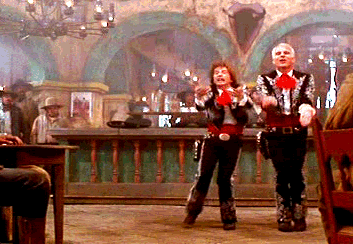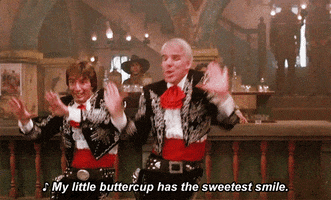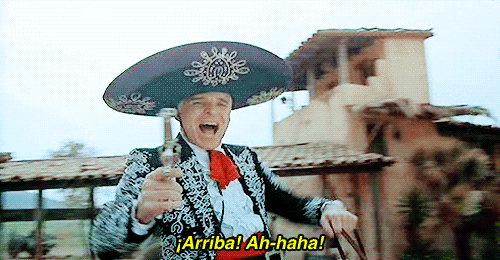Three Amigos Is a Goddamn Delight. It's Just Too Bad About All the Racism and Imperialism!
A lifetime ago I interviewed Repo Man and Sid & Nancy director Alex Cox for The A.V Club, and he had this to say about Three Amigos, which he was approached to direct after the breakthrough success of Repo Man: “Three Amigos really seemed to be an apology for American involvement in Latin America. That was the overall message of it, that it's all right for us to go down into Mexico and sort these beaners out. I had a meeting with Steve Martin where I said to him, 'Of course, we're going to have to address the issue of the Central American and El Salvador business. We have to talk about all that before we can really get to the other stuff.' [Laughs.] That was the end of me.”
Needless to say, John Landis’ version of Three Amigos did not address American colonialism in Central American politics or use Hollywood’s distant past to comment upon America’s contemporary involvement in El Salvador. The movie is escapism, unapologetic about its depiction of Mexico as a realm of good-hearted villagers waiting to be saved by a trio of white morons as well as a haven for wild-eyed, drunken, disheveled banditos with disturbing ideas about sexual consent.
The filmmakers had a chance to use the obliviousness of its idiotic yet weirdly weirdly lovable white American protagonists to comment on the myopia and narcissism that has historically characterized American foreign policy, but instead chose to eschew satire completely in search of old-fashioned laughs. To give director John Landis, screenwriters Steve Martin, Lorne Michaels and Randy Newman and stars Martin, Martin Short and Chevy Chase credit, Three Amigos’ relentless quest for chuckles is largely successful. There are some big laughs and unforgettable set-pieces in Three Amigos that help explain why the film has become something of a cult classic.
Hell, during a day trip in Cozumel, Mexico while onboard the Kid Rock Chillin’ the Most Cruise a few years back, I even frequented an officially licensed Three Amigos-themed cantina. So while the film was a critical and commercial disappointment at the time of its release it clearly resonated with some people in an almost disconcertingly deep and lasting way.
Three Amigos is a weirdly narrow crowd-pleaser. It seems custom-designed for comedy-obsessed 10 year olds like the movie-mad boy I was when I saw it in the theater, as well as for cinephiles with long memories, broad frames of reference and a weakness for perversely specific show-business commentary. In this case, Three Amigos is a feature-length riff on the incongruously fussy, effeminate nature of matinee idols in the silent film era, with their pancake or lead-based make-up, elaborate, frilly costumes and general air of effete foppishness. Whether the leading man in question is Rudolph Valentino or the titular trio of white dullards, the silent film world’s conception of rugged masculinity looks awfully feminine and dainty by modern standards.
Even the screen names of the film’s leads — Lucky Day, Dusty Bottoms and Ned Nederlander — sound like they should belong to strippers, male or female (it doesn’t matter), or horses rather than heroic, manly men of action. Steve Martin, Chevy Chase and Martin Short play the leads as consummate pretenders who seem like they were born wearing make-up and sporting big, plastic movie star smiles.
Lucky, Dusty and Ned are huge box-office attractions in blockbusters where they save impoverished villages without breaking a sweat or wrinkling their freshly-pressed outfits. But when they make the mistake of switching up their formula and speaking up for themselves, they are unceremoniously tossed off the lot and their pampered lives of make-pretend heroism and derring-do comes to an end. Around the same time, a desperate Mexican villager, convinced that the Three Amigos are real heroes, offers to pay the trio a princely sum to rid her town of the deadly and treacherous El Guapo (Alfonso Arau) and his men. Due to misunderstandings and their own astonishing stupidity, the threesome thinks that all they need to do is put on a little show for the crowd in order to pick up a big payday.
Lucky, Dusty and Ned are so dense that it takes them half the film to realize that what they think is pretend is actually real. With their frozen smiles, robotically performed routines and unceasing peppiness, the heroes resemble animatronic versions of cowboys more than they do the real thing, yet they find themselves in real trouble with real outlaws all the same.
The Three Amigos are dithering idiots but they’re not phonies. They’re genuinely sweet human beings so accustomed to the formula and foolishness of show-business that they can’t conceive of anything outside of it. They’re impossibly wholesome, clean-cut good guys in a dirty and corrupt world. The pleasure Martin, Chase and Short take in sashaying their way through clamorous ditties is infectious. They may be morons but they are adorable in their obliviousness and hilarious in their inability to process the world as anything other than a Sunday morning matinee morality play where evildoers are punished and innocence triumphs.
Three Amigos is never better than when luxuriating in its own artifice, in its deliberate phoniness, particularly in an incongruously lovely campfire scene in the most beautifully fake Western soundstage I have ever seen. Three Amigos is the only screenplay credit on Randy Newman’s resume but just as importantly, Newman wrote three songs for the film. These work beautifully as both pitch-perfect parodies of particular styles of pop songs and as music. In that respect, the songs might actually be too catchy.
“My Little Buttercup,” for example, is a loving homage to the kind of claptrap you might find in a Shirley Temple vehicle, although even she might have nixed the song for being overly sappy and precious. The other songs are employed so smartly and effectively that I found myself wishing that Three Amigos had gone all in and been a proper musical.
Then again, the nice thing about Three Amigos not being a musical is that the songs come as delightful surprises and the element of surprise would have been lost if Three Amigos was the kind of movie where characters sing and dance at predictable intervals. Judging by their performances, it seems like Martin, Short and Chase wish the film was a musical as well.
The actors never look happier than when they’re singing a song or performing tightly choreographed routines. Chase has seldom been funnier or more likable as one of several genial, charming idiots. Martin is a hoot as the self-styled brains of the operation and Short, in his first major role after establishing himself as a standout on both SCTV and Saturday Night Live, radiates both boyishness and girlishness as a former child star turned adult attraction.
Alas, Three Amigos is only unexpectedly sweet and innocent when it comes to its white characters. The trio are intentionally one-dimensional, painted clowns too stupid to delineate between movies and real life but they’re still drawn with more nuance and affection than the Mexican characters.
At best, the Mexican characters are mere props on hand to give the white American characters something and someone to save. At worst, the depiction of Mexicans as drunken, violent criminals feels problematic bordering on racist. The show-business comedy of Three Amigos is a hoot but the Western elements feel arbitrary and overly familiar, as well as consistently unfunny.
I laughed at Three Amigos a lot more than I have many comedies I would recommend without reservation. Yet there’s something about the movie that keeps me from being able to love it unconditionally. I suspect that’s probably because I just watched it, and all of its stock and disappointing elements are fresh in my mind. I suspect I will remember it more fondly in the years ahead. Because I am human, I will probably forget the forgettable elements of Three Amigos and cling to the elements of the film that don’t just work, but work so spectacularly that they linger in the mind, making things like a Mexican Three Amigos-themed Cantina a reality in blatant defiance of God’s will several decades after the film only seemed to have come and gone quietly.
Would you like to read an entire BOOK full of pieces like this? Then check out the Kickstarter for The Happy Place’s next book, The Fractured Mirror: Nathan Rabin’s Happy Place’s Definitive Guide to American Movies About the Film Industry here: https://www.kickstarter.com/projects/weirdaccordiontoal/the-fractured-mirror?ref=project_build
The Joy of Trash, the Happy Place’s first non-"Weird Al” Yankovic-themed book is out! And it’s only 16.50, shipping, handling and taxes included, 30 bucks for two books, domestic only!
PLUS, for a limited time only, get a FREE copy of The Weird A-Coloring to Al when you buy any other book in the Happy Place store!
Buy The Joy of Trash, The Weird Accordion to Al and the The Weird Accordion to Al in both paperback and hardcover and The Weird A-Coloring to Al and The Weird A-Coloring to Al: Colored-In Special Edition signed from me personally (recommended) over at https://www.nathanrabin.com/shop
Or you can buy The Joy of Trash here and The Weird A-Coloring to Al here and The Weird Accordion to Al here
Help ensure a future for the Happy Place during an uncertain era AND get sweet merch by pledging to the site’s Patreon account at https://www.patreon.com/nathanrabinshappyplace We just added a bunch of new tiers and merchandise AND a second daily blog just for patrons!
Alternately you can buy The Weird Accordion to Al, signed, for just 19.50, tax and shipping included, at the https://www.nathanrabin.com/shop or for more, unsigned, from Amazon here.
I make my living exclusively through book sales and Patreon so please support independent media and one man’s dream and kick in a shekel or two!







